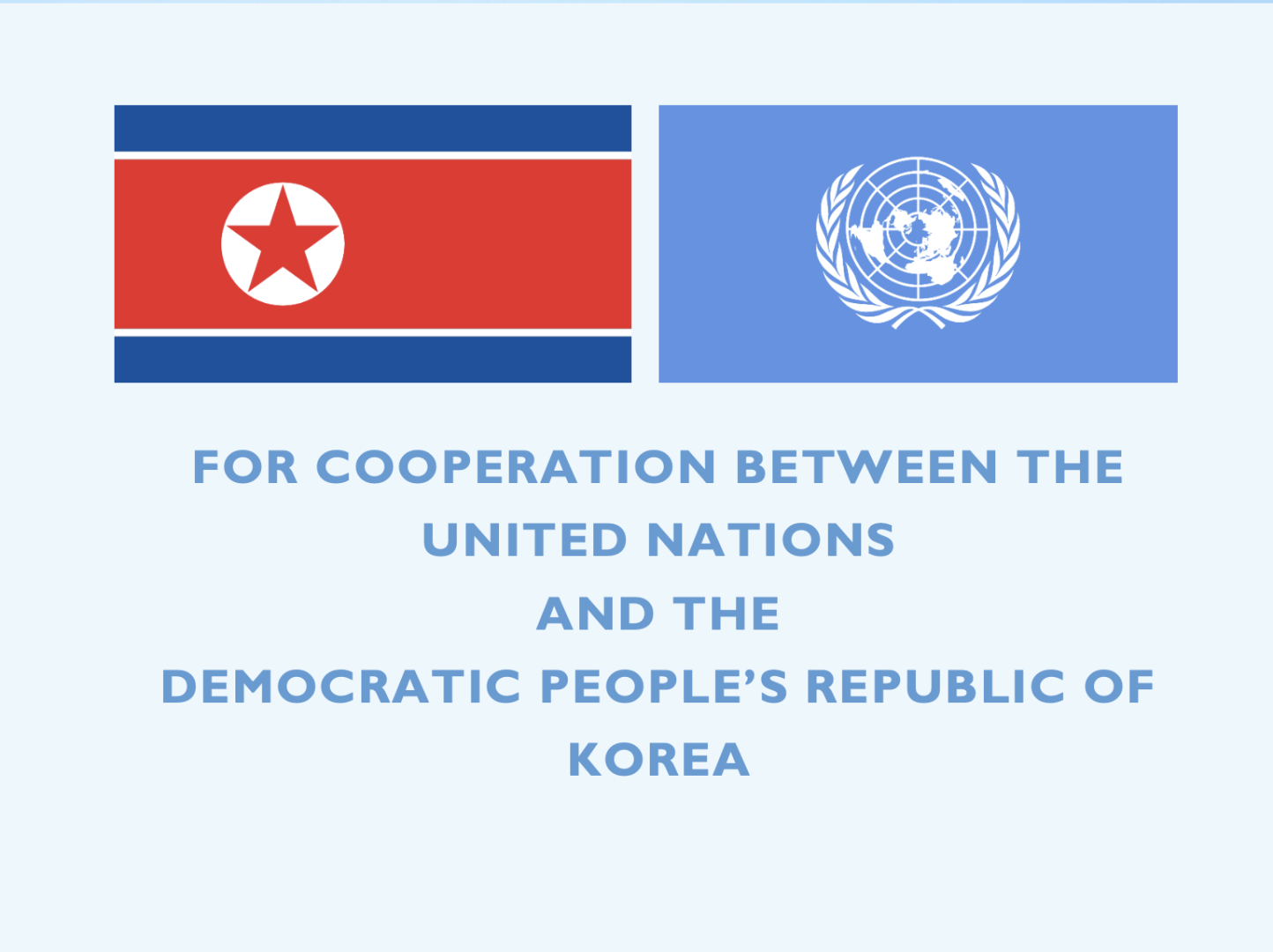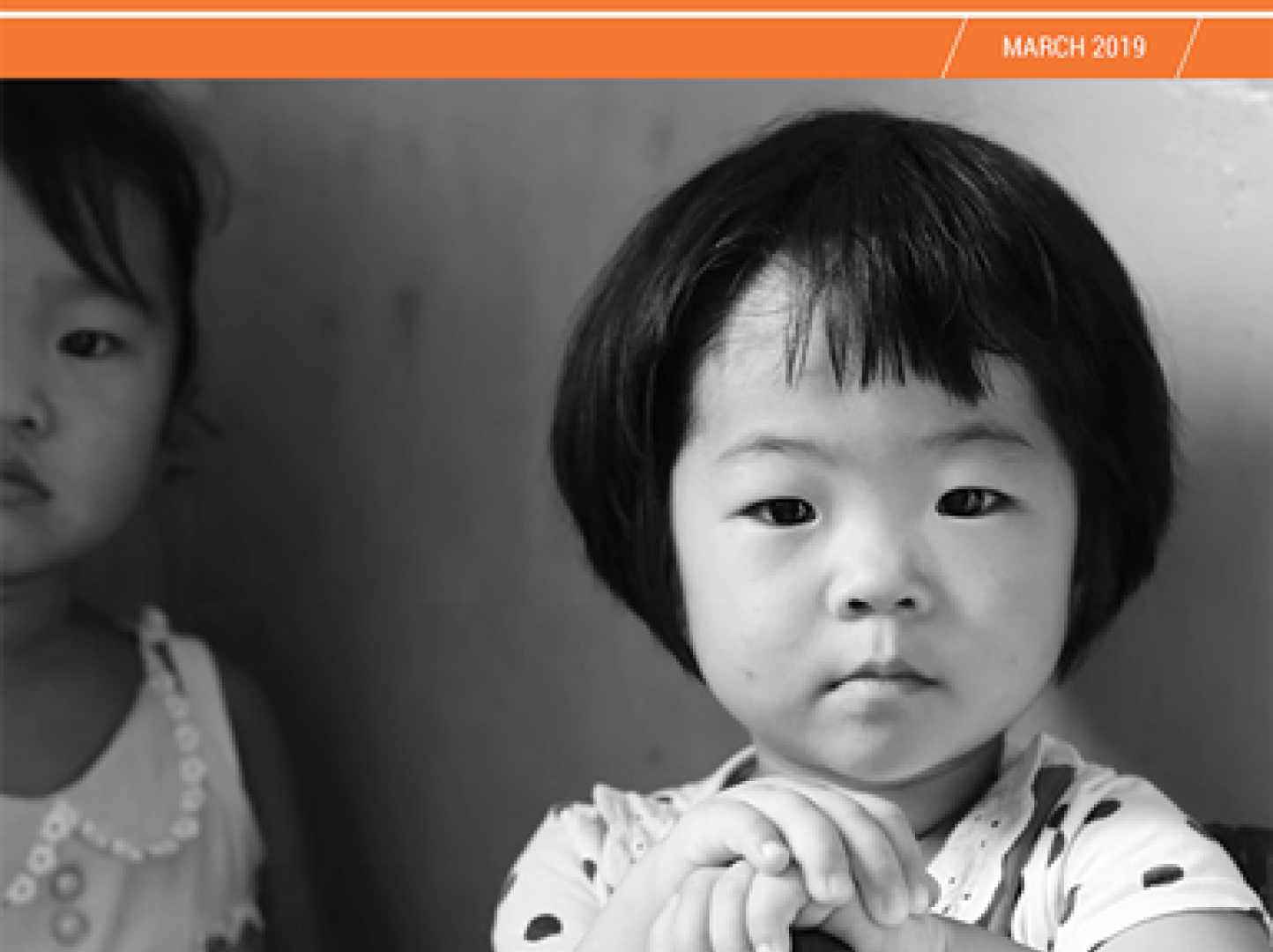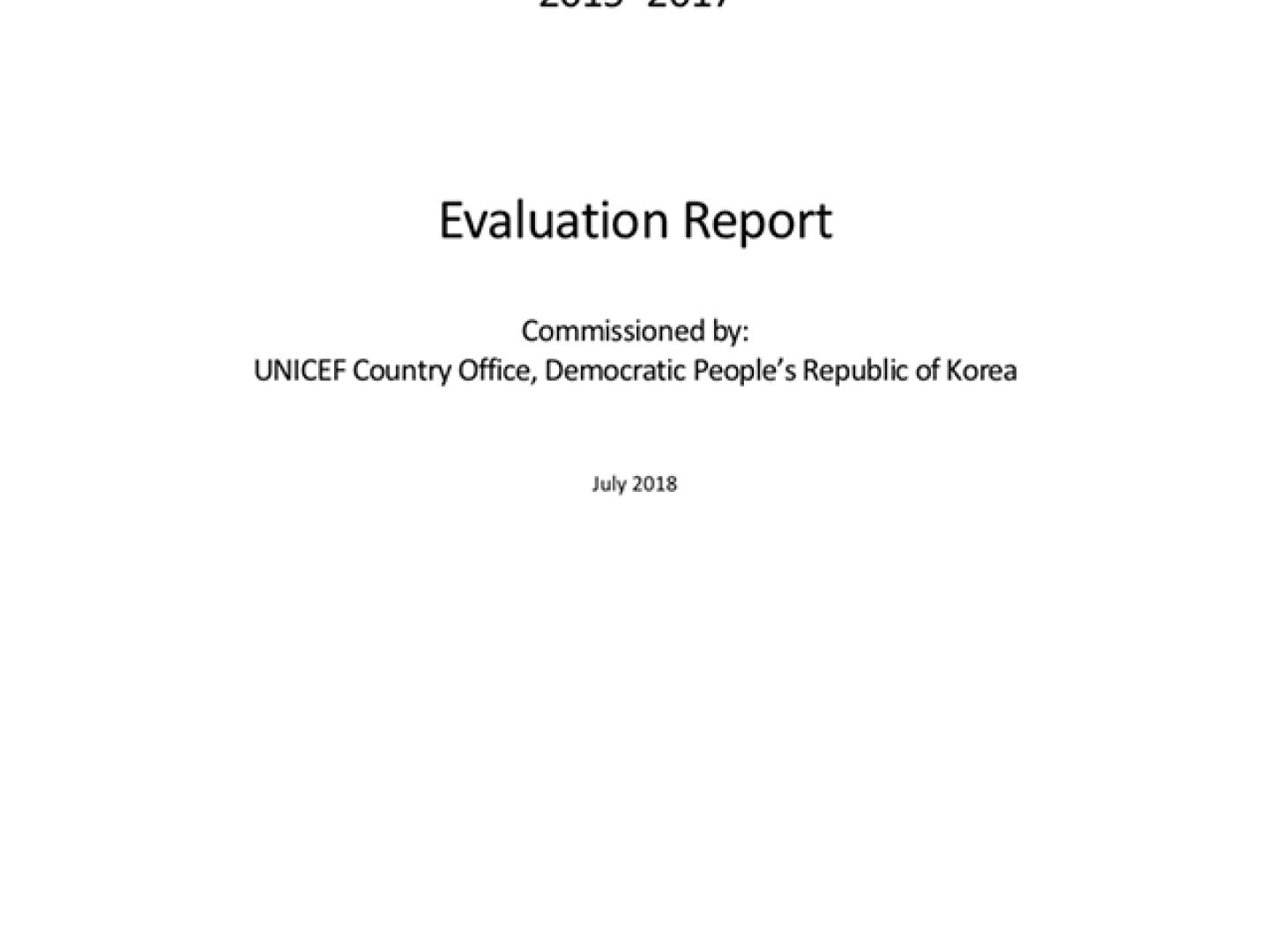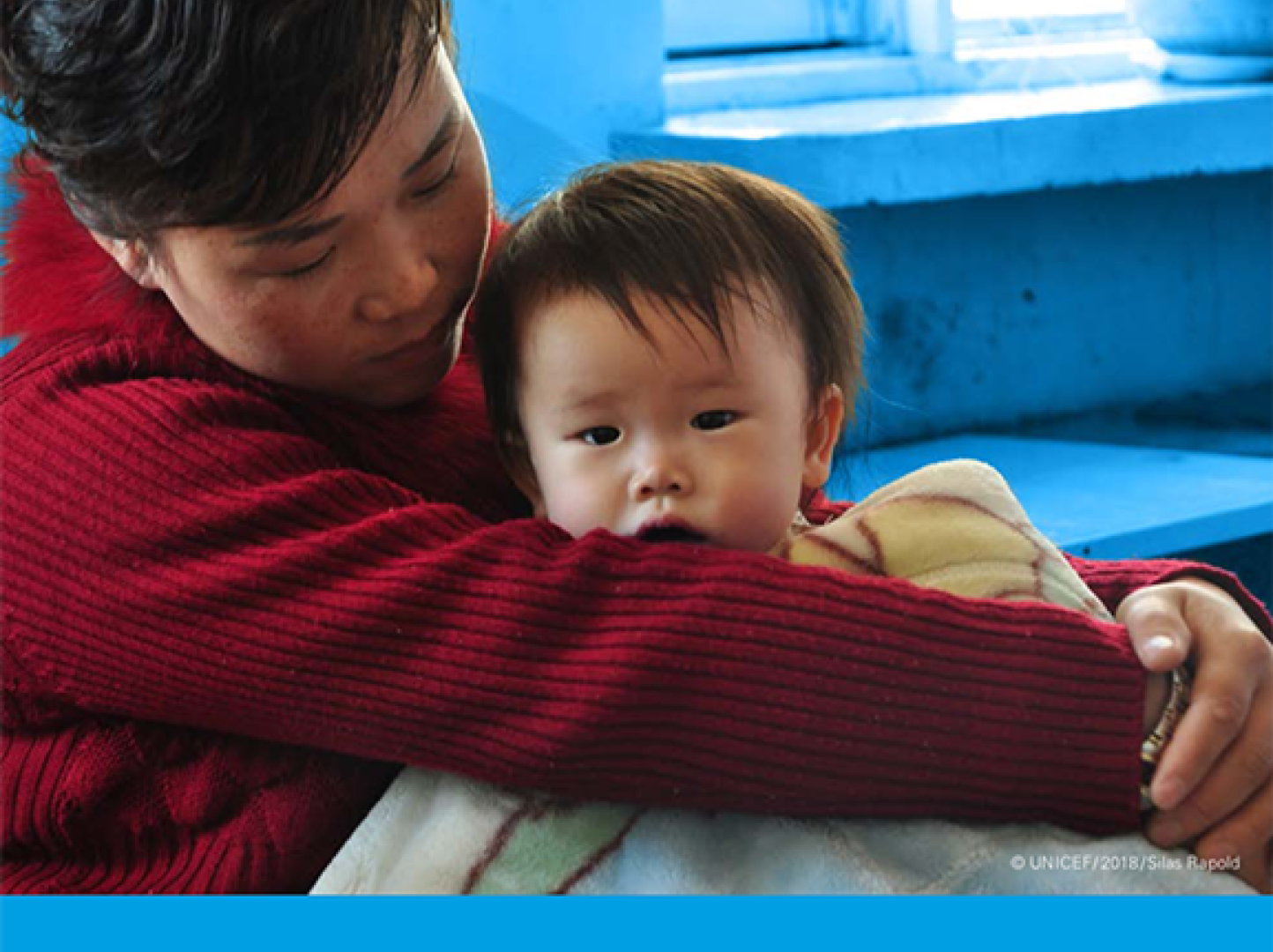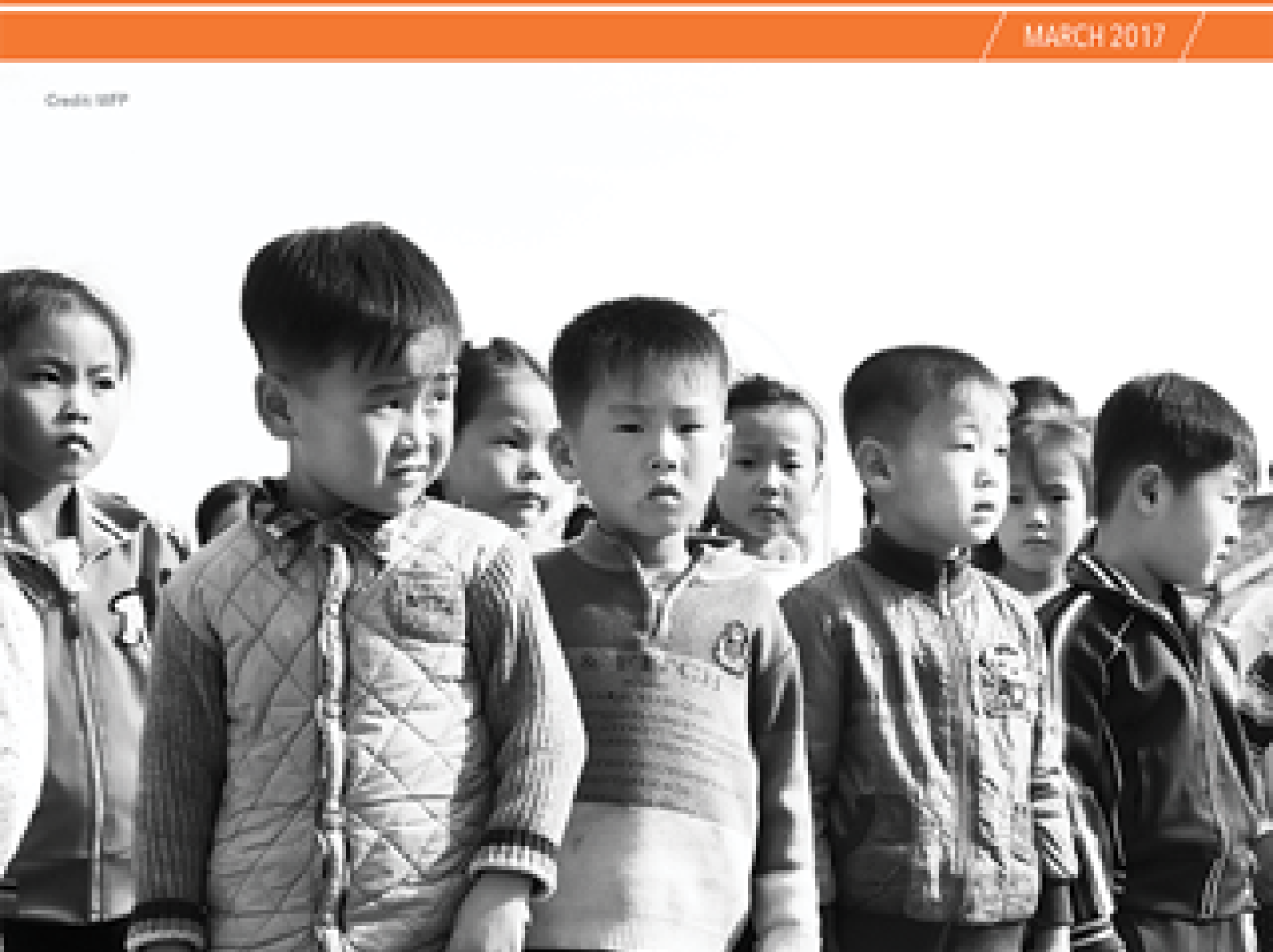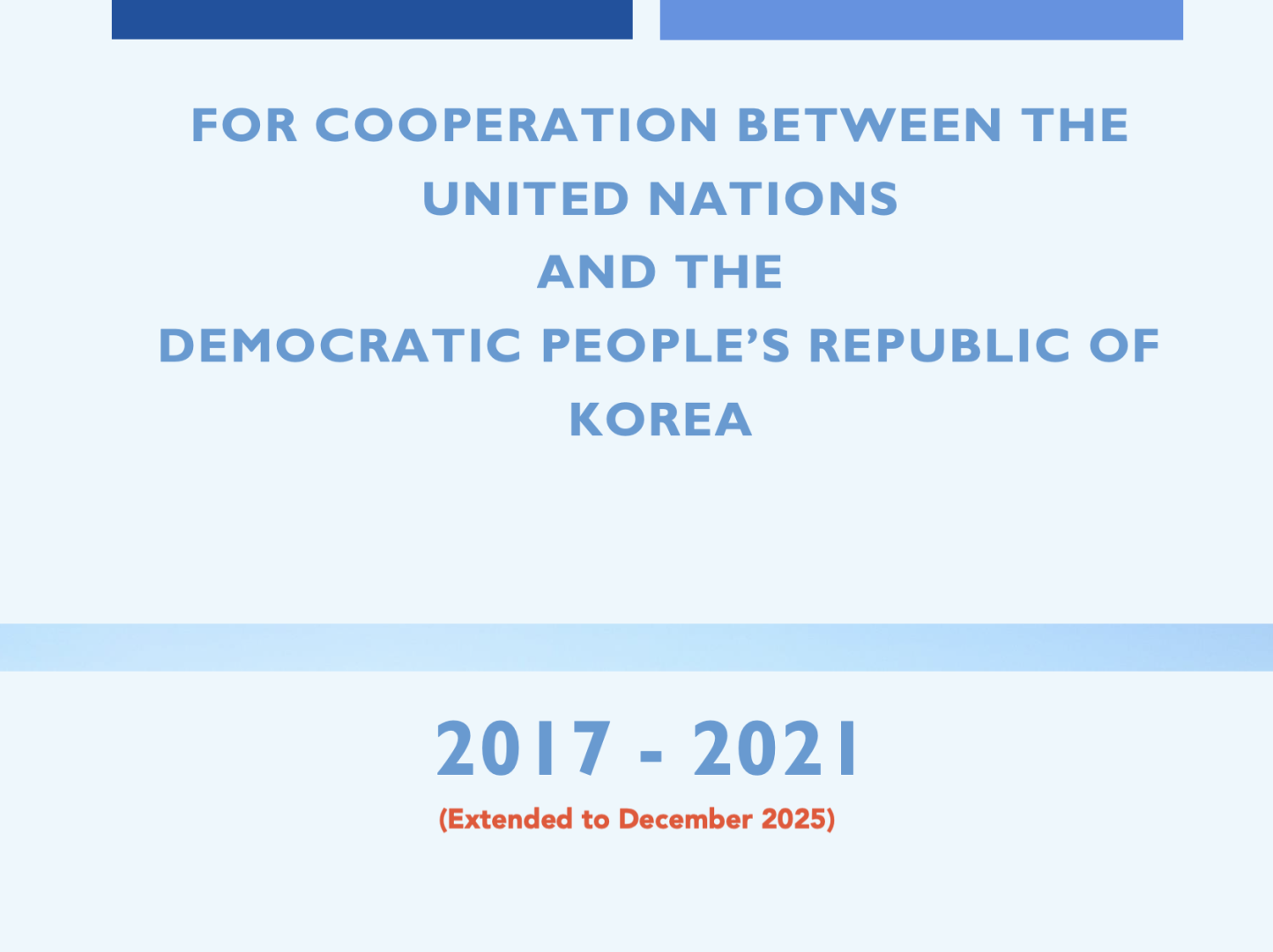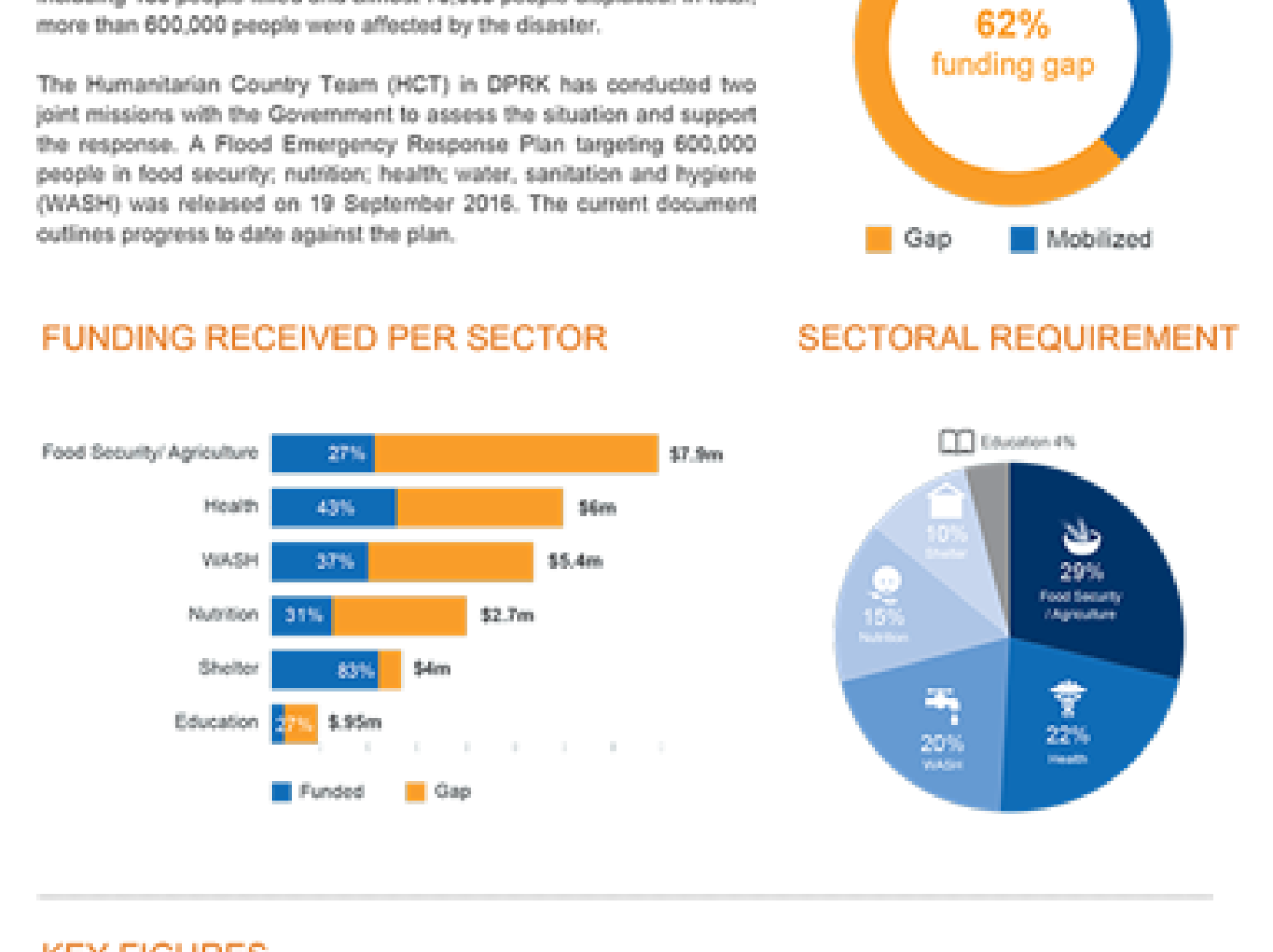Latest
The Sustainable Development Goals in Democratic People's Republic of Korea
The Sustainable Development Goals are a global call to action to end poverty, protect the earth’s environment and climate, and ensure that people everywhere can enjoy peace and prosperity. These are the goals the UN is working on in DPRK:
Press Release
01 March 2024
Secretary-General Appoints Joe Colombano of Italy United Nations Resident Coordinator in Democratic People’s Republic of Korea
The United Nations Secretary-General Antonio António Guterres appointed Joe Colombano of Italy as the United Nations Resident Coordinator in the Democratic People’s Republic of Korea. He assumes his role on 1 March with the host Government’s approval.Mr. Colombano has over 25 years of experience in international relations and negotiations on political and development issues with the multilateral system, including at Headquarters and in the field. Within the Organization, he served most recently as Head of the Office of the United Nations Resident Coordinator to China in Beijing. He was previously with the Executive Office of the Secretary-General in New York, where he served for almost a decade, including as Director for Sustainable Development. In that role, he coordinated the office’s political strategy to facilitate the international agreement on the Sustainable Development Goals. He also served as Senior Adviser to the World Health Organization (WHO) Special Envoy for COVID-19 in Geneva.An economist by training, Mr. Colombano built a career in development finance, first at the World Bank in Washington, D.C., and later in London, at the European Bank for Reconstruction and Development, including as Adviser to its Board of Directors. His field experience includes roles in the private sector in Bangkok, Thailand; with the Central Bank of the Democratic Republic of the Congo in Kinshasa; in addition to many official missions to the countries of the former Soviet Union.Mr. Colombano is a member of the Advisory Council of the Mossavar-Rahmani Center for Business and Government at Harvard Kennedy School in Cambridge, United States. He is the author of “Learning from the World: New Ideas to Redevelop America” published by Palgrave McMillan, in addition to numerous academic papers on economic development and international affairs.Mr. Colombano holds a master’s degree in public administration from Harvard University, a master’s degree in international political economy from the University of Warwick, United Kingdom, and a Master of Laws in Chinese law from the University of Hong Kong, China. He is married and has three daughters.
Story
16 December 2025
UNCT DPRK discusses 2026 outlook
The UNCT DPRK met on 16 December 2025 to discuss their programmatic and operational outlook for 2026, against the backdrop of deepening divisions in the UN membership, an adverse funding environment, and the protracted lack of access to the country. On the upside, colleagues took note of recent signs of DPRK re-engagements with the UN, including the participation of Vice-Minister of Foreign Affairs Kim Son Gyong in the General Assembly along with his bilateral meeting with the UN Secretary-General in September, and the recent visit to the DPRK by UN colleagues from the International Maritime Organization in November. During the discussion, the UNCT also considered its first horizon scanning exercise to identify emerging risks and opportunities and inform its strategy. The DPRK's new Five-Year Plan for National Economic Development (2026-2030), expected to be launched at the Ninth Congress of the Workers Party next month in Pyongyang, was recognized as the foremost opportunity for the UNCT country work going forward.
1 of 5

Story
11 December 2025
RC meets UNICEF Deputy Regional Director for East Asia and Pacific
On 11 December 2025, United Nations Resident Coordinator Joe Colombano met Mr. Myo-Zin Nyunt, UNICEF’s Deputy Regional Director for East Asia and the Pacific and recently designated acting Representative in the Democratic People’s Republic of Korea, at their regional offices in Bangkok. The RC and the Deputy Regional Director discussed the work of the UNCT in the Democratic People’s Republic of Korea and the prospects for the return of the UNCT to Pyongyang. The RC also recognized Mr. Myo-Zin Nyunt’s direct experience with working in Pyongyang and thanked UNICEF for their ongoing activities to provide life-saving vaccines to pregnant women and children in the DPRK.
1 of 5

Story
01 December 2025
RC attends the 2025 Global Resident Coordinators Meeting in New York
UN Resident Coordinator Joe Colombano attended the 2025 Global Resident Coordinators Meeting held under the theme “The role of Resident Coordinators in 2026: Leading a stronger, more effective UN in countries for SDG acceleration” on 1- 5 December in New York. The agenda of the meeting included dedicated dialogues with Secretary-General António Guterres, Deputy Secretary-General Amina Mohammed, representatives of UN member states, and UN Principals. Discussions focused on the RCs’ convening and coordinating role to leverage UNCT capacity to advance the SDGs at country-level, in the context of the Secretary-General’s UN80 initiative. On the margins of the event, RC Colombano paid a visit to the Permanent Representative of the DPRK to the United Nations, Ambassador Kim Song. The RC also met with colleagues from the Department of Political and Peacebuilding Affairs (DPPA), the Office for the Coordination of Humanitarian Affairs (OCHA), and the Development Coordination Office (DCO).
1 of 5

Story
26 November 2025
Rotation of the Permanent Representative of the DPRK to ESCAP
On 26 November 2025, UN Resident Coordinator Joe Colombano hosted the incumbent Permanent Representative of the DPRK to ESCAP, Mr. Ri Nam Song, and his successor, the Permanent Resident-designate, Mr. Ri Kwang Chon. During the farewell call with Mr. Nam Song, the RC expressed his sincere thanks to the PR for his longstanding commitment to the United Nations and the Resident Coordinator, specifically. While temporarily based in Bangkok, it was critical for the RC to be able to rely on the support and guidance of the PR to build up the relationship with the DPRK authorities, ahead of taking up residence in Pyongyang. The RC also warmly welcomed the arrival of Mr. Ri Nam Song’s successor, PR-designate Mr. Ri Kwang Chon. At their first courtesy call, the RC expressed his firm belief on the importance of dialogue and face-to-face meetings, especially at a time of divisions in the UN membership. He invited the PR to consider the Country Team as the DPRK’s extended family overseas, and part of the DPRK’s own team to backstop its UN work. Mr. Ri Kwang Chon will officially take up his assignment effective 1 December 2025.
1 of 5
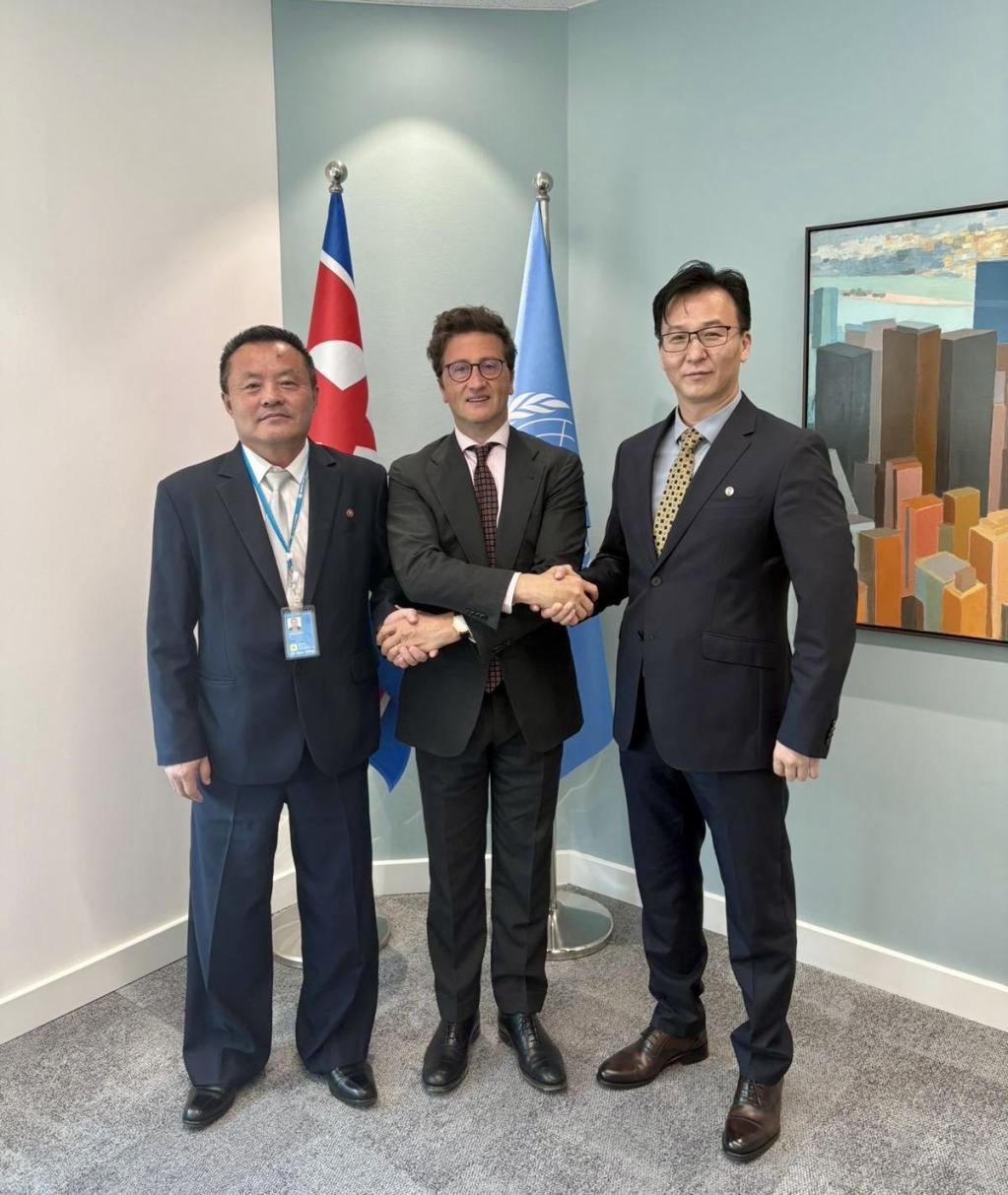
Story
17 November 2025
International Maritime Organization visits DPRK
Staff from the International Maritime Organization (IMO) visited the DPRK on the week of 17 November to conduct a technical audit as part of the IMO Member State Audit Scheme (IMSAS). The Scheme aims to provide an audited Member State with a comprehensive and objective assessment of how effectively it administers and implements mandatory IMO instruments which are covered by the Scheme. IMO colleagues met counterparts from the Maritime Administration of the DPRK and visited a number of locations as part of the audit. This was the first time UN international staff members were able to enter the DPRK since the visit of the Director-General of the FAO in July 2024.
1 of 5

Press Release
22 April 2025
UN Secretary-General António Guterres’ message for International Mother Earth Day, observed on 22 April
Mother Earth is running a fever. Last year was the hottest ever recorded: The final blow in a decade of record heat.We know what’s causing this sickness: The greenhouse gas emissions humanity is pumping into the atmosphere, overwhelmingly from burning fossil fuels. We know the symptoms: Devastating wildfires, floods and heat. Lives lost and livelihoods shattered.And we know the cure: Rapidly reducing greenhouse gas emissions and turbocharging adaptation to protect ourselves — and nature — from climate disasters.Getting on the road to recovery is a win-win. Renewable power is cheaper, healthier, and more secure than fossil fuel alternatives. And action on adaptation is critical to creating robust economies and safer communities, now and in the future. This year is critical.All countries must create new national climate action plans that align with limiting global temperature rise to 1.5°C — essential to avoid the worst of climate catastrophe.This is a vital chance to seize the benefits of clean power. I urge all countries to take it, with the Group of Twenty (G20) leading the way. We also need action to tackle pollution, slam the brakes on biodiversity loss, and deliver the finance countries need to protect our planet.Together, let’s get to work and make 2025 the year we restore good health to Mother Earth.
1 of 5
Press Release
07 March 2025
UN Commemoration of International Women’s Day
This International Women’s Day, we celebrate the women leaders across the United Nations, breaking down barriers and striving for equality from the UN headquarters to our teams on the ground. These women inspire action for all women and girls.Link to Video.
1 of 5
Press Release
25 January 2025
International Day of Women in Multilateralism - 25 January 2025
1 of 5
Press Release
30 December 2024
WMO Press Release: Climate change impacts grip globe in 2024
Climate change impacts gripped the globe in 2024, with cascading impacts from mountain peaks to ocean depths and on communities, economies and the environment. The year 2024 is set to be the warmest on record, capping a decade of unprecedented heat fuelled by human activities, according to the World Meteorological Organization (WMO). Greenhouse gas levels continue to grow to record observed highs, locking in even more heat for the future.“Today I can officially report that we have just endured a decade of deadly heat. The top ten hottest years on record have happened in the last ten years, including 2024,” said UN Secretary-General António Guterres in his New Year message.“This is climate breakdown — in real time. We must exit this road to ruin — and we have no time to lose. In 2025, countries must put the world on a safer path by dramatically slashing emissions, and supporting the transition to a renewable future,” he said.WMO will publish the consolidated global temperature figure for 2024 in January and its full State of the Global Climate 2024 report in March 2025. “In my first year as WMO Secretary-General, I have issued repeated Red Alerts about the state of the climate,” said WMO Secretary-General Celeste Saulo. “WMO marks its 75th anniversary in 2025 and our message will be that if we want a safer planet, we must act now. It’s our responsibility. It’s a common responsibility, a global responsibility,” she said.“Every fraction of a degree of warming matters, and increases climate extremes, impacts and risks. Temperatures are only part of the picture. Climate change plays out before our eyes on an almost daily basis in the form of increased occurrence and impact of extreme weather events,” she said. “This year we saw record-breaking rainfall and flooding events and terrible loss of life in so many countries, causing heartbreak to communities on every continent. Tropical cyclones caused a terrible human and economic toll, most recently in the French overseas department of Mayotte in the Indian Ocean. Intense heat scorched dozens of countries, with temperatures topping 50 °C on a number of occasions. Wildfires wreaked devastation,” she said.The increasingly extreme weather underlines the urgency of the Early Warnings for All initiative, which along with supporting climate service development and delivery, is a key part of WMO’s activities to support climate adaptation. On the climate mitigation front, WMO is rolling out the Global Greenhouse Gas Watch initiative, and supporting the United Nations Framework Convention on Climate Change (UNFCCC) and COP. In 2025, there will be a strong focus on the cryosphere - the frozen parts of the Earth including sea ice, ice sheets, frozen ground – as it is the International Year of Glaciers’ Preservation, facilitated by UNESCO and WMO. Throughout 2024, a series of reports from the WMO community highlighted the rapid pace of climate change and its far-reaching impacts on every aspect of sustainable development. Climate change intensified 26 of the 29 weather events studied by World Weather Attribution that killed at least 3700 people and displaced millions, according to a new report from World Weather Attribution and Climate Central.The report said that climate change added 41 days of dangerous heat in 2024, harming human health and ecosystems, according to the report entitled When Risks Become Reality: Extreme Weather In 2024.As global temperatures rise and extreme heat events become more frequent and severe, there is a growing need for enhanced international cooperation to address extreme heat risks. A targeted group of experts representing 15 international organizations, 12 countries, and several leading academic and NGO partners convened at WMO headquarters from 17-19 December to advance a coordinated framework for tackling the growing threat of extreme heat. This is in response to the UN Secretary-General's Call to Action on extreme heat.It is one of many initiatives by the WMO community to safeguard public health through improved climate services and early warnings. As it marks its 75th anniversary in 2025, WMO will continue to coordinate worldwide efforts to observe and monitor the state of the climate, support international efforts to mitigate and adapt to climate change.[source]
1 of 5
Press Release
03 September 2024
UNICEF Press Release: Nearly one million children and pregnant women in the Democratic People's Republic of Korea to receive life-saving routine vaccines
UNICEF The vaccination campaign in the Democratic People’s Republic of Korea (DPRK) started yesterday, September 2, 2024. This photo features one of the first mothers and her child receiving the vaccine at a hospital in Pyongyang.BANGKOK, 3 September 2024 – More than 800,000 children and 120,000 pregnant women will be vaccinated in a nationwide campaign launched on Monday by the Government of the Democratic People's Republic of Korea (DPRK) with UNICEF support. The vaccination campaign will reach children and pregnant women in all 210 counties who have missed out on life-saving vaccines since the COVID-19 pandemic began in 2020. “This campaign is a major milestone in our drive to vaccinate every child in the DPRK and protect them from common childhood diseases,” said UNICEF DPRK Acting Representative Roland Kupka. “This is the first step in restoring routine immunization and closing the gap that has left children vulnerable to preventable diseases.”With support from Gavi, the Vaccine Alliance, UNICEF assisted the Ministry of Public Health with the delivery of over four million doses of essential vaccines — including Pentavalent, Measles-Rubella (MR), Tetanus-Diphtheria, BCG, Hepatitis B, and Inactivated Poliovirus Vaccine (IPV) — to the DPRK in July to kickstart this comprehensive catch-up effort. Of these, two million doses will be used in the current catch-up vaccination campaign, while the rest will be sent to health centers nationwide to boost routine immunization programs.National immunization rates in the DPRK exceeded 96 per cent before the COVID-19 pandemic but had dropped to below 42 per cent by mid-2021, leaving countless children at risk of deadly diseases such as polio, diphtheria, measles, rubella, and hepatitis.UNICEF has supported three previous catch-up vaccination campaigns in the DPRK between 2021 and 2023, reaching a combined total of nearly 1.3 million children who missed essential vaccinations during the pandemic's peak. Additional shipments are expected to reach the DPRK by the end of this year. UNICEF also supplied new freezers, fridges, cold boxes, and temperature taggers to keep vaccines effective in even the most remote areas. Additionally, over 7,200 health workers were trained to manage vaccination campaigns and handle any potential vaccine reactions. UNICEF is also supporting the campaign by overseeing vaccine delivery and administration, and tracking coverage to ensure its success.“To sustain progress in restoring pre-pandemic vaccination levels and ensuring every child receives essential, life-saving vaccines, we urge the DPRK government to swiftly allow the return of UNICEF and UN international staff in the country,” said Kupka.[source]
1 of 5
Latest Resources
1 / 11
Resources
03 August 2019
1 / 11




















